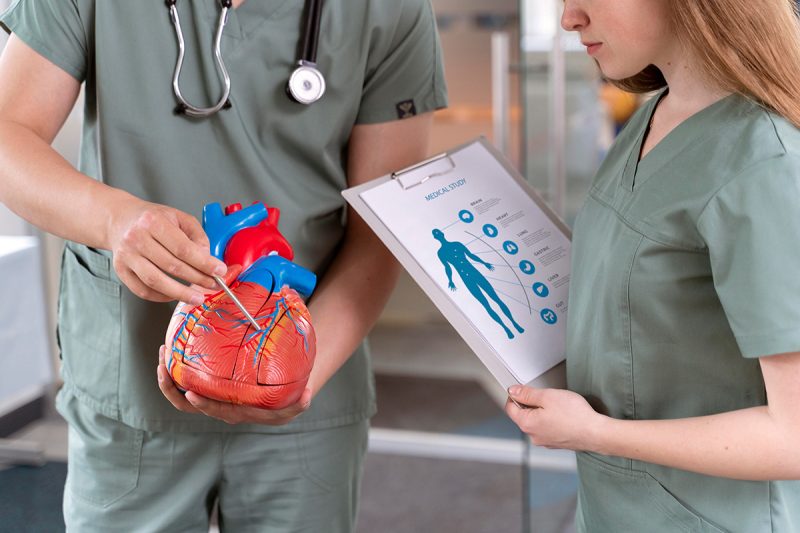Latest advances in Cardiac Care: Heart Diagnosis is where it begins

It may surprise you to know that 1 in 3 deaths in the world happen on account of heart failure. That is a big number, and it explains why Cardiac Care is at the forefront of the medical research. What Heart Diagnosis also helps is that cardiac care is needed in the western world, because of a higher percentage of old age citizens. This gives incentive to pharma companies to invest monies in cardiovascular research. This is good news for India too because, like most lifestyle diseases, India has the unenviable title of cardiovascular disease capital of the world. There are many ways to prevent heart problems and Heart Diagnosis it is always advisable to take precaution. However, heart failures are a fact of life and it is only prudent that we keep ourselves updated about the latest news in cardiovascular research and cutting-edge developments in the treatment of heart attacks.

It is often said that a stitch in time saves nine. And while this is true in life, nowhere is this saying more apt that with heart failure treatment. The nature of a heart attacks is that they are sudden and leave very little time for the patient to be taken to the hospital and provide the right treatment. Early and accurate diagnosis of a person at risk for heart attacks greatly increases their chances of survival. Hence, the bulwark of Cardiac Care is timely and accurate diagnosis of potential heart attacks. Doing accurate diagnostics used to be a long, complicated and expensive affair. This is where advances in cardiovascular research are truly revolutionizing the heart failure treatment process. Let’s talk about some of these advances.
What if your doctor has experience dealing with millions of heart failure treatment cases?
One of the most common and reliable start points for Cardiac Care is to get scans like echo cardiograms, CT scans and MRIs done for a person suspected of being in need of heart failure treatment. A trained heart surgeon then analyzes these scans and interprets the results. The whole treatment process is dependent on how correct the surgeon is in his or her diagnosis. However, diagnosing a complex organ like the heart doesn’t follow a standard formula. This judgement comes from long training and experience in Cardiac Care, and having treated hundreds or maybe thousands of patients in need of heart failure treatment. This is why the expertise and judgement of a physician is vital in heart failure treatment. But how much experience can a human being really have?
A heart surgeon with multiple decades of experience, who has never taken a day off and treated at least one Cardiac Care case every day, would have experience of treating tens of thousands of patients. What if there was a doctor who had experience of lakhs of cases from the past and their experience is increasing by thousands of heart failure treatment cases every day? This is where Artificial Intelligence is becoming a game changer in Cardiac Care. AI models are being trained over millions of cases that hospitals and pharma companies have collected over decades. These cases cover all the variations of age, gender, race, income etc. Artificial Intelligence models train themselves not only on past cases but also thousands of cases which are added daily.
These models won’t replace your surgeons anytime soon. Think of these models like the Hawk Eye technology that is used in cricket. It’s a great tool, but not the final decision maker. That’s still left to the umpires. It is exactly what Artificial Intelligence models are doing for cardiac care surgeons. Analyzing the data, showing patterns and giving their opinion, leaving the surgeons to take the final call. The advent of AI in cardiac care diagnostics is the best of both worlds, with the processing power of machines and empathy of humans.
Wearables revolution is changing nature of Cardiac Care too: It’s in the nature of technology that its usage keeps evolving over time. Mobile phones, that started as communication devices, changed into cameras, morphed into entertainment consoles and now are the leading form of payments. Similarly, wearables like Smart watches, wrist bands, eye wear etc., which might have started off as fashion and lifestyle products, are now increasingly being used in cardiac care to monitor heart rhythm, blood pressure, activity levels etc. Arrhythmia or irregular heartbeat is one of the major categories of heart failures and connected wearables are providing doctors with an ability to not only monitor the patients round the clock but also communicate with them in case they detect any abnormalities. Wearables are now an integral part of heart failure treatment routine, providing constant medical oversight over patients. Wearables, in combination with artificial intelligence, are bringing a revolution in cardiac care by enabling the doctors to act proactively. Doctors don’t have to wait for heart failure symptoms to appear. They can instead anticipate them and take corrective actions.
Biomarker Testing: While diagnostic techniques for cardiac care like scans give a snapshot of how your heart and arteries look like and wearables monitor the indicators, one fundamental factor still limits them. They are monitoring only the physical symptoms of underlying heart ailment. What if there was a way for doctors to monitor your body from the inside? That has been the aim of cardiovascular research and Biomarkers have made it possible. Biomarkers are substances that are introduced in the bloodstream and help measure the enzymes, proteins, chemical composition directly to determine the state of the heart. Some of the commonly used bio markers are Cardiac troponin, Creatinine kinase (CK), Myoglobin etc.
Cardiac Care is seeing so many new noninvasive techniques being developed in heart ailment diagnostics that it won’t be an exaggeration to say that there are hardly any secrets of heart that won’t be revealed to a person who is proactive about getting his screenings and diagnostics done. These new cardiac care techniques can enable us to detect anything wrong with our heart and take corrective measures. It’s up to us to make the best use of these and protect ourselves.
Frequently Asked Questions
Good digestion ensures proper nutrient absorption, strengthens immunity, and boosts energy levels. It also prevents complications like weight gain, hormonal imbalances, and chronic diseases.
Consider the insurer’s financial stability, claims process, coverage terms, and inclusion of services like teleconsultation and diagnostic tests. These factors ensure smooth access to care and timely claim settlements.
Poor digestion can cause nutrient deficiencies, weakening the immune system and leading to fatigue. It’s also linked to weight gain, diabetes, and mental health issues.
Adopt a balanced diet rich in fiber and fermented foods, quit smoking, avoid alcohol, exercise regularly, and manage stress to support healthy digestion.
It offers comprehensive benefits, including hospitalization, diagnostic tests, and teleconsultation, with a reduced waiting period for pre-existing conditions and cashless treatments.
Hi, my name is Om, and I am a developer at Carepal Secure. With a strong passion for technology and innovation, I enjoy creating effective solutions and learning new skills to enhance my expertise. My journey in development has been both challenging and rewarding, allowing me to grow professionally while contributing meaningfully to the projects I work on.












